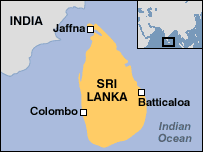 Hindus in Sri Lanka were forced to cancel their prayers due to threats and intimidation by the Sri Lankan Security forces, said Transnational Government of Tamil Eelam (TGTE).
Hindus in Sri Lanka were forced to cancel their prayers due to threats and intimidation by the Sri Lankan Security forces, said Transnational Government of Tamil Eelam (TGTE).
According to local Tamil newspapers and other sources this incident happened on September 4, 2014 in Jaffna, in the North of the Island. This was the second time in recent days that Hindus have to cancel their prayers due to threats by Sri Lankan Security Forces said TGTE.
These prayers were organized by families who were forced out of their homes by the Sri Lankan Government forces during the war. They were praying that the Sri Lankan Government allow them to return their homes.
These families were living in refugee camps for several years facing numerous abuses, including sexual abuses by the Sri Lankan Security forces.
On September 4, 2014 large number of armed Sri Lankan Security forces arrived at the place where the families have set up a structure to hold prayers. The Security forces threatened the families to remove the structure and stop the prayers. They were threatened with dire consequences if they fail to obey their orders. Fearing reprisals families cancelled their prayers and removed the structures.
Restrictions on Hindus to worship is increasing in Sri Lanka. According to BBC (Tamil service) a recent judgment requires Hindus to get permission from local government officials to perform their prayers.
During the civil war in Sri Lanka, hundreds of Hindu Temples were attacked and destroyed by the Sri Lankan Security forces. Numerous Hindu priests were also killed by the Sri Lankan forces.
Transnational Government of Tamil Eelam’s (TGTE) Minister for Homeland Affairs Ms. Balambihai Murugadas has appealed to the United Nations Special Rapporteur on freedom of religion Mr. Heiner Bielefeldt, to take steps to ensure that Hindus in Sri Lanka can worship without intimidation and threats by the Sri Lankan Security forces.
BACKGROUND:
Tamils, who are mostly Hindus, have faced repeated mass killings since 1958 and the mass killings in 2009 prompted UN Secretary General Ban Ki-moon to appoint a Panel of Experts to report on the scale of killings.
According to the report by this UN Panel, tens of thousands of Tamil civilians were killed and women were sexually abused and raped by the Sri Lankan Security Forces (According to UN Internal Review Report over 70,000 Tamils were killed in five months in 2009).
These Tamils were killed due to deliberate and intense shelling and bombing of areas designated by the government as “no-fire zones”, where Tamil civilians had assembled for safety. The Sri Lankan Government also restricted food and medicine for Tamils, resulting in large numbers of people dying from starvation and many of the injured bleeding to death.
According to the UN Panel, the killings and other abuses that took place amount to war crimes and crimes against humanity. Independent experts believe that there are elements of these abuses that constitute an act of genocide.
According to a May 2012 report by the British Foreign and Commonwealth Office on Human Rights and Democracy; there are up to 90,000 Tamil war widows in the North-East of Sri Lanka.
UN Human Rights Council in March 2014 established an international war crimes investigation to investigate these killings and the investigations have begun.
A Buddhist Monk shot and killed a Sri Lankan Prime Minister in 1958 for having talks with Tamil political leaders to find a solution to the conflict.
Members of the Sri Lankan security forces are almost exclusively from the Sinhalese community and the victims are all from the Tamil community. According to several sources, Tamil areas have the highest concentration of security forces in the world (Ratio: For every five civilian one military).
Tamils overwhelmingly voted in a Parliamentary election in 1977 to establish an independent and sovereign country called Tamil Eelam. This Parliamentary election was conducted by the Sri Lankan Government.
ABOUT TRANSNATIONAL GOVERNMENT OF TAMIL EELAM (TGTE):
Transnational Government of Tamil Eelam (TGTE) is a democratically elected Government of Tamils (from the island of Sri Lanka) living in several countries. TGTE was formed after the mass killing of Tamils by the Sri Lankan Government in 2009.
TGTE held internationally supervised elections among Tamils around the world to elect 132 Members of Parliament and is leading a campaign to realize Tamils’ political aspirations through peaceful, diplomatic and democratic means.
TGTE has a bicameral legislature and a Cabinet and held one of its Parliamentary sittings in the British Parliament. The Constitution of the TGTE mandates that it should realize its political objective only through peaceful means.
The Prime Minister of TGTE is Mr. Visuvanathan Rudrakumaran, a New York based lawyer.





